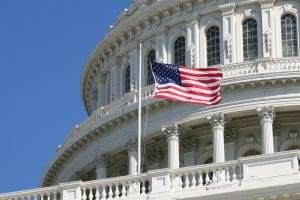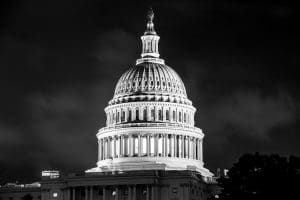The economic crisis caused by the coronavirus pandemic poses a triple challenge for tax policy in the United States. Lawmakers are tasked with crafting a policy response that will accelerate the economic recovery, reduce the mounting deficit, and protect the most vulnerable.
To assist lawmakers in navigating the challenge, and to help the American public understand the tax changes being proposed, the Tax Foundation’s Center for Federal Tax Policy modeled how 70 potential changes to the tax code would affect the U.S. economy, distribution of the tax burden, and federal revenue.
In tax policy there is an ever-present trade-off among how much revenue a tax will raise, who bears the burden of a tax, and what impact a tax will have on economic growth. Armed with the information in our new book, Options for Reforming America’s Tax Code 2.0, policymakers can debate the relative merits and trade-offs of each option to improve the tax code in a post-pandemic world.

Congress Passes $900 Billion Coronavirus Relief Package
The coronavirus relief package represents the second-largest recovery legislation, behind only the CARES Act, for a combined total of more than $3 trillion in support.
8 min read
Pandemic Highlights the Need for Better Tax Policy for Entrepreneurs and Small Businesses
As Congress works to provide another round of emergency economic relief, it is a good time to step back and consider how tax policy affects entrepreneurs and small businesses.
3 min read
Gross Receipt Taxes Become Part of New Jersey’s Recreational Marijuana Legalization
By the time marijuana is sold to a consumer, local taxes could be applied four different times—by one or more localities.
5 min read
Where State Unemployment Compensation Trust Funds Stand in December
With 2020 nearing its close, state unemployment compensation trust funds continue to struggle under the weight of so many pandemic-created beneficiaries, though some funds are beginning to stabilize as people increasingly return to work.
3 min read
State Tax Collections Down 4.4 Percent Through September, While Local Tax Collections Rise
Combined state and local tax collections were down only $7.6 billion across the period, representing a total state and local tax revenue decline of 0.7 percent compared to the first nine months of 2019.
6 min read
Arkansas Lieutenant Governor Looks to Eliminate Income Tax
Lt. Governor Griffin’s goal to eliminate the income tax is a commendable one that should be considered with cautious optimism, though with the understanding that even a well-designed process may end up putting more weight on an already uncompetitive sales tax. In the meantime, there is plenty of space for incremental improvements in Arkansas’s income tax that will make the state more competitive.
4 min read
Senate Policymakers Release $908 Billion Bipartisan COVID-19 Relief Proposals
A bipartisan group of lawmakers released two compromise relief bills to address the COVID-19 pandemic, totaling about $908 billion: The Emergency Coronavirus Relief Act and the Bipartisan State and Local Support and Small Business Protection Act.
4 min read
Details and Analysis of State and Local Aid Under the Bipartisan State and Local Support and Small Business Protection Act of 2020
On Monday, members of the bipartisan Gang of Eight negotiating an end-of-year pandemic relief package announced that they had settled on language and had divided the package into two bills: a pandemic aid package and a $160 billion state and local support package.
6 min read
2020 Spanish Regional Tax Competitiveness Index
The Regional Tax Competitiveness Index (RTCI) for Spain allows policymakers, businesses, and taxpayers to evaluate and measure how their regions’ tax systems compare. This Index has been designed to analyze how well regions structure their tax system. Additionally, it serves as a road map for policymakers to reform their tax systems and make their regions more competitive and attractive for entrepreneurs and residents.
7 min read
Individual and Business CARES Act Tax Provisions Due to Expire on December 31
Any additional relief to address a temporary economic crisis should be temporary, targeted toward those most in need, and consistent with good long-term tax policy.
3 min read